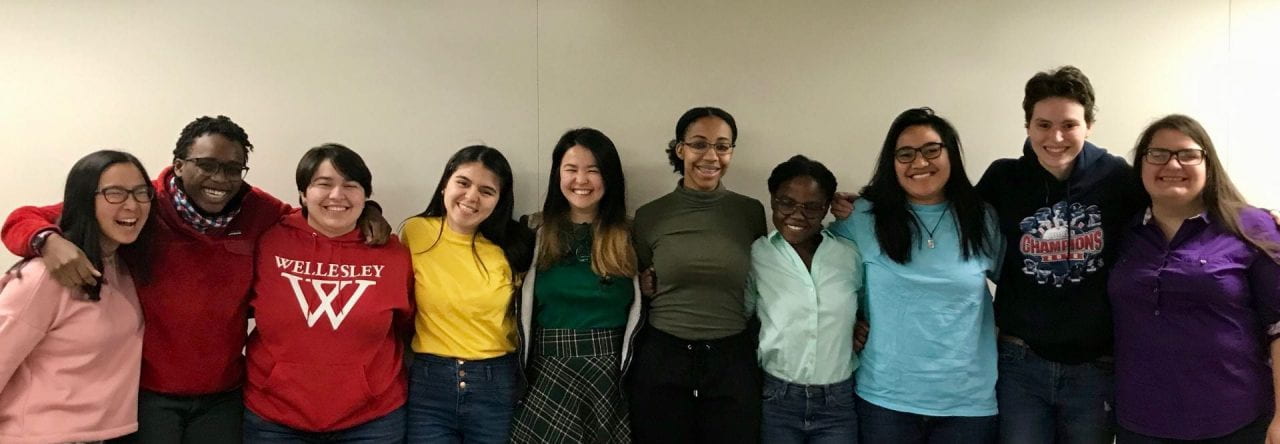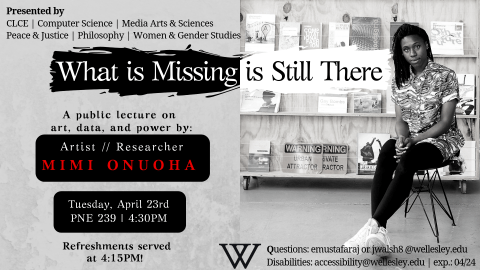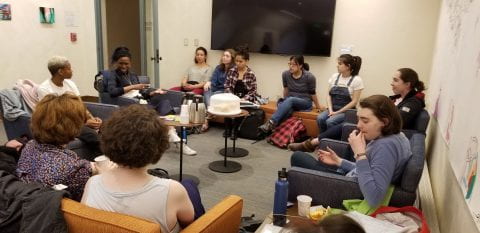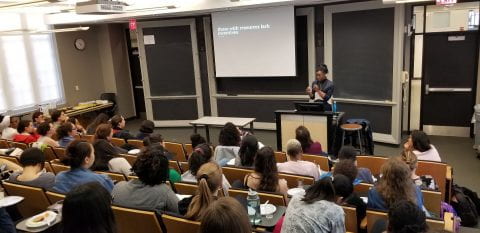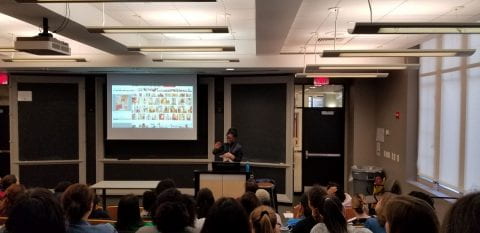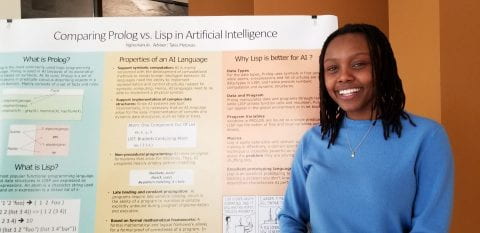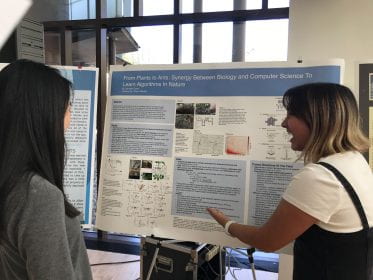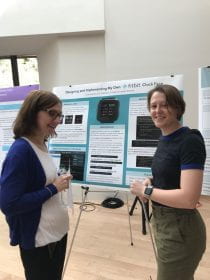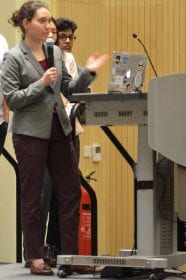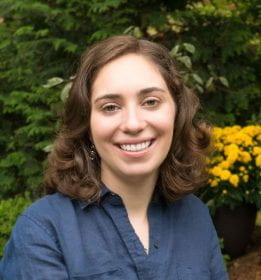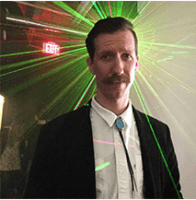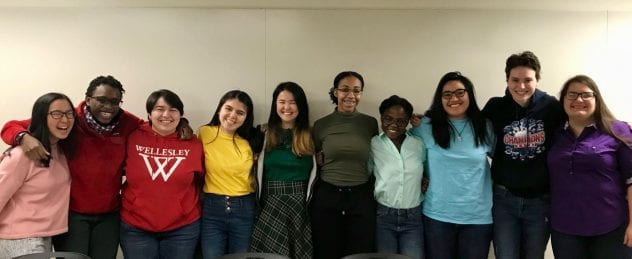This project displays posters of non-binary folk and women of color in technology as inspiration to our current CS students. Almost all the role models in technology are white males (for example, Bill Gates, Steve Jobs, and Mark Zuckerberg). Female college students, however, are more inspired by an outstanding female rather than male role models. This project aims to encourage women in CS to see themselves as having a career in the field. If our students can see bold reminders in academic settings that there are women of color thriving in STEM, this can influence how they see themselves with respect to the field of Computer Science. Role models can signal to Black and Latinx students that they are valued. Our goal is to create a space in the Science Center to counteract the message that society has given to black and brown girls. In our teaching spaces, role models can represent what is possible.
Congratulations to Allison for the acceptance of her extended abstracts in both conferences! She has spent the Fall 2019 semester studying how various entities can control and monetize the Internet, and the effect of that control on Internet traffic and user experience.
Allison will be presenting her work at the Harvard National Collegiate Research Conference (NCRC) 2020, which is the nation’s largest student-run research conference, in January 2020. Then, she’ll travel to Montana to give a talk, titled “Fair Control of the Internet: Understanding Methods, Effects and How to Know What’s Being Done to Your Traffic”, at the National Conferences on Undergraduate Research (NCUR) 2020.
According to the NCUR 2020 review committee,
“Chosen from more than 4,000 submissions, your abstract demonstrates a unique contribution to your field of study, and we are glad to offer you the opportunity to present your work to your peers, faculty, and staff from all over the nation.
In May 2019, the Computer Science Faculty approved the following statement:
Introduction
The Wellesley College Computer Science Department community includes:
- Computer Science faculty and staff
- Computer Science and Media Arts and Sciences majors and minors
- all students enrolled in our classes
- students who are interested in taking our courses
- alums
As a community, we believe that equitable access to education is morally imperative and that students have the right to enjoy an inclusive educational environment. To follow through on this belief, we understand that we all need to be aware of our conscious and unconscious biases, as well as systemic biases within our institutions, and we must do our best to counteract and erode those biases. We will strive to be continuously and actively engaged in inclusive practices that will build a community where all feel welcome and empowered to learn and thrive. We acknowledge that applying these values will not be straightforward, and we must be ready to educate and support each other as we aspire to live up to the principles we agree on.
In outlining our community values, we intend this statement to be a catalyst for self-reflection and change and an acknowledgment that we will always have work to do in making our community a more inclusive space.
Community Values
Because each member of our community has their own unique perspective, particularly when it comes to how best to uphold our values, we hope to find common ground in these shared principles that can help us approach issues surrounding inclusion. These are not the only principles that members of our community share, but they are a minimal set of principles that are sufficient to inform our efforts at promoting inclusion in our department and community. We also hope that these values will help guide our interactions with the world outside of our community, including the broader society we live in and the specific technical communities that we are each members of.
Equitable opportunity. Every person should have equitable access to educational opportunities, and specifically to the opportunities that our department affords. Systems or actions that restrict access to educational opportunities in our department, especially to the degree to which they do so unevenly, run counter to this principle.
Respect for all. Every person deserves respect. Actions which demean or disrespect people run counter to this principle, and we denounce those in our broader society who advocate against the basic rights or dignity of anyone.
Free inquiry and expression. We welcome members of our community to freely pursue their own interests and express their perspectives in ways that are compatible with our first two principles of equitable opportunity and respect.
As part of the Science Center renovation and construction project, the Microfocus lab (and the rest of Sage Hall) will soon close to make way for new parts of the building. The class of 2019 decorated the Science Center for the last day of classes of the 2018-2019 year (and the last day ever in much of the Science Center).
The Microfocus beehive was also featured in the Daily Shot.
Distinguished alum and computing pioneer Mary Allen Wilkes ’59 (also recently featured in NYT Magazine) gave a CS colloquium talk to a standing-room-only crowd on Tuesday, 9 April 2019. She spoke about her work developing the operating system and programming environment of the LINC, an early personal computing system that revolutionized biomedical research, as well as the history of women in computing.
The talk was recorded (available here, talk starts at 2:40) and Mary Allen prepared a handout with recommended reading for the audience.
Abstract
The Laboratory Instrument Computer (LINC), created in the early 1960s at MIT, constituted a sea change from computing using large, off-line, remote, centrally-controlled computers to computers that were small, interactive and operated under the direct control of their individual users. The LINC revolutionized biomedical research, and was the gateway to personal computing. Mary Allen Wilkes was a member of the LINC development team. She will describe the dramatic transformation in biomedical research caused by the LINC, and its foreshadowing of the personal computers of today. She will also give a brief summary of the history of women in the computer field, and her experience in it in the 1960s. Ironically, the field may have been more open to women then than it is today.
Bio
Mary Allen Wilkes worked in the computer field for 11 years before turning to a career as a lawyer. As a computer programmer in the 1960s at MIT, she participated in the development of the LINC computer and wrote its system software, including its interactive operating system LAP6, one of the earliest such systems for a personal computer. Her work was recognized in Great Britain’s National Museum of Computing‘s 2013 exhibition “Heroines of Computing” at Bletchley Park, and by the Heinz Nixdorf MuseumsForum in Paderborn, Germany, in its 2015-16 exhibition, Am Anfang war Ada: Frauen in der Computergeschichte (In the beginning was Ada: Women in Computer History).
Wilkes is a graduate of Wellesley College and the Harvard Law School. She practiced law in the Boston area for over 35 years, including practice as a trial lawyer, an Assistant District Attorney for Middlesex County, an arbitrator for the American Arbitration Association, and an instructor in the Trial Advocacy Workshop at the Harvard Law School. She also served for eight years as a judge of the Annual Willem C. VIS International Commercial Arbitration Moot competition in Vienna, Austria, organized by Pace University Law School.
Wilkes is the author of “Conversational Access to a 2048-Word Machine” about the LINC operating system (Comm. of the Association for Computing Machinery 13, 7, pp. 407–14, July 1970) and “Scroll Editing: an On-line Algorithm for Manipulating Long Character Strings,” which describes the LAP6 document editing function (IEEE Trans. on Computers 19, 11, pp. 1009–15, November 1970).
Mimi Onuoha, currently a creative in residence at Olin College, visited Wellesley on 23 April 2019 and gave a talk, What is Missing is Still There, sponsored by CLCE,Computer Science, Media Arts & Science, Peace & Justice,
Philosophy, and Women & Gender Studies.
Mimi Onuoha is a Nigerian-American, Brooklyn-based new media artist and
researcher whose work deals with the missing and obscured remnants forged
from a society based on automation. Through layerings of code, text,
interventions, and objects, she seeks to explore the ways in which people
are abstracted, represented, and classified. Onuoha is fascinated by how
metrified societies require the fluid, organic, messiness of people to be
secured, tagged, categorized, and abstracted. In a world mediated by
computers, everything begins to look like data, and that which doesn’t fit
the mold is at risk of being forgotten.
Senior CS majors presented at this year’s CS senior poster fair, April 17.
The National Science Foundation recognized 4 Wellesley CS+ Alumnae in the Graduate Research Fellowship Program.
Madeleine Barowsky ’18 was awarded an NSF Graduate Research Fellowship. She was also awarded the National Physical Science Consortium Graduate Fellowship. Madeleine was a CS major at Wellesley and has since been working at Google. She will join the Harvard University PhD program in CS.
Senior CS majors Jennifer Chien ’19 and Emma Lurie ’19 and alum Isabelle Rosenthal ’16 were recognized with Honorable Mentions in the NSF Graduate Fellowship Program.
Jennifer will attend the CS PhD program at University of California, San Diego. Emma will attend the PhD program in information sciences at University of California, Berkeley. Isabelle, who took a few CS courses at Wellesley while majoring in neoroscience, is a graduate student in Computation and Neural System at the California Institute of Technology.
CS faculty member Jordan Tynes is highlighted in the Wellesley News for his work advancing technology on campus.
CS111 tutors recently showed up for a staff meeting as a collective rainbow. CS111 faculty are still looking for the pot of gold in E111. Tutors are, from L-R: Carmen Chan, Tamara Deshong, Karisa Zdanky, Khonzoda Umarova, Angelina Li, Lakeyia Mumford, Daphka Alius, Kalau Tanaka-Pesamino, Amelia Briwn and Analiese Ludwig.
